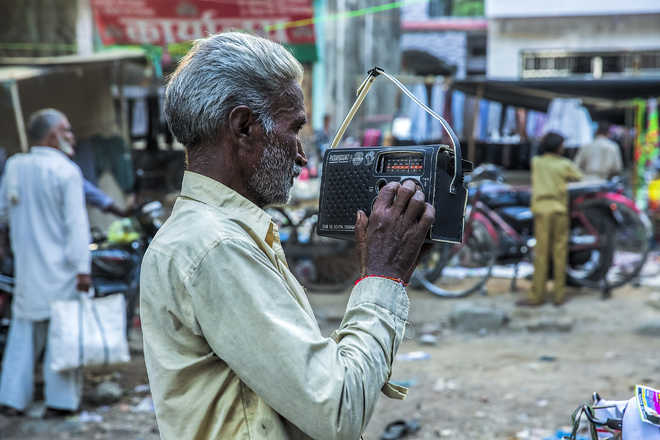
SANDEEP SINHA
My first memory of radio is when I rushed to glue my ear to the transistor. Tony Greig, the 6 feet 6 inches tall England all-rounder, had lifted Little Master Gundappa Viswanath, who had played a wonderful innings. It was the seventies and the English team under Tony Lewis was touring India. Love for cricket, no doubt, cemented the attachment to radio and it was a common sight to see people walking on the streets, ears glued to pocket transistors, listening to cricket commentary.
Those were also the days when a licence had to be obtained from the post office for keeping a set in lieu of a fee. My family had a National Panasonic, acquired from Nepal, and it was only much later that the formality of renewing its licence was done away with. The set is still tucked away somewhere in the family home, a reminder of the passion it evoked in a bygone era, and the neglect that the advent of technology has wrought on it.
Radio in those days was about news and current affairs, sports and of course music. The fans of Vividh Bharati and Radio Ceylon with its Binaca Geetmala programme, boosted by the magical voice of Amin Sayani, were in legions and so were the newsreaders like Deokinandan Pandey, Barun Haldar and Surojit Sen, just as one has come to admire RJ Minakshi after listening to FM radio in the morning at Chandigarh. For someone, whose nearest railway station, till recently, was the town of Jhumri Tilayya, the film song-based programmes will continue to evoke nostalgia, with its long list of aficionados.
One was reminded of all this while reading a book “Veterans Recall Radio Days”, a collection of memoirs by the doyens of radio news in India, brought out by the News Services Division of All India Radio. Ira Joshi, Director General (News), says in the preface that the 8 am Hindi news was very popular not just in India but also outside it. This was mainly for two reasons — to know from an authentic source what was happening in India, and to teach Hindi to their children because correct pronunciation is very important for radio. People used to correct their watches with the AIR news time, as there was no difference of even seconds in the time of the bulletins. At a time when TV has made radio seem outdated with visuals accompanying the news, Joshi says radio continues to be relevant like in Karimnagar district of Andhra Pradesh where government schools have been asked to make the children listen to news bulletins at 12 pm and 2 pm to improve their English and general knowledge.
The All India Radio had a sarkari tag to it, which it found difficult to shake off, the most obvious pointer being the assassination of Mrs Indira Gandhi. There was no word on it and people heard it mostly from the BBC, in my case Radio Australia. But there is an interesting aside to it. Old-timers may recall the faux pas over the announcement of the death of Loknayak Jayaprakash Narayan during the Janata Party government’s reign. It had so happened that a patient kept in a room adjoining JP had died and the relatives were grieving. The police officer on duty thought JP had died. They did not check with the doctors and instead informed their seniors who in turn passed on the information to the Home Minister, leading to a chain of goof-ups. The AIR Bombay correspondent, however, denied the news. Finally, it was checked with the medical authorities and the denial issued. After this, adequate care is taken not to put out such news before having checked with the authorities concerned, the book says.
Listening to radio could also be a rigmarole in those days. The search for radio stations, especially on short wave, the wavering of voices, the suspension of favourite programmes in case of the death of a dignitary, could be irritating. But it was about a nascent nation, hope and idealism in those days with its emphasis on authenticity and inclusiveness. All sections of the population were catered to. Programmes like Chaupal, Bal Mandali, Samayaki, Spotlight and Sportscan sought to meet the needs of a diverse range of listeners.
In an age when we have a surfeit of technology, the signature tune of the All India Radio, composed incidentally by a Czech man Walter Kaufmann, based on raga Shivranjini, will continue to haunt its listeners for a long, long time. Ironically, there is no mention of it in the collection, but it is not needed, so firmly perhaps it is etched in memory.


























